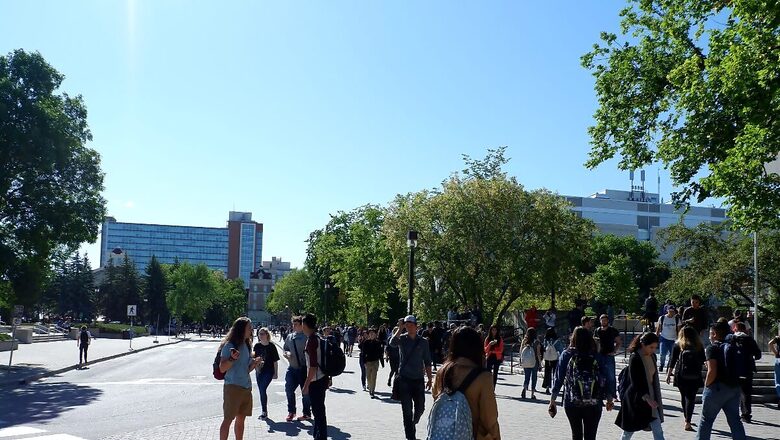‘Agents Don’t Tell Truth & Indian Parents Are Ignorant’: Food, Housing, Work Crises Unfold in Canada

views
Gagan Singh, 19, has changed four places of accommodation since he came to Canada from Ludhiana, Punjab, in the summer intake. From staying with a relative for the initial months to moving out to a basement and then to a friend’s house, Singh is still not sure when he will have to pack his bags next. He has been looking for a part-time job to be able to get a rented room after his employer hired someone else on a low wage and asked him to leave.
Extremely low wages, sky-high rents, basement shared by groups of new students, buses packed with passengers not stopping by on some routes, especially in Ontario, dependence on food banks for groceries are some of the observations of the young and freshly out-of-school Indians about the living standards for international students in present-day Canada.
Indians comprise 40% of international students living in Canada, that is, roughly 2.4 lakh.
The ongoing diplomatic row between India and Canada has brought the spotlight on the working and living conditions for international students in Justin Trudeau’s country. Over the past few months, there has been an acute problem of housing, food and jobs for the new students who got enrolled in Canadian colleges and universities this summer, and it has got only worse by the fall (September) intake.
Students blame colleges for expanding classes without having any accommodation facilities for international students as well as unscrupulous agents in India who have been selling a false dream to young students who just prepare to leave for Canada right after completing school. Also, the Justin Trudeau government has been facing flak at allowing its educational institutions to issue study permits to as many students without having enough infrastructure to support them.
International Student Influx Post-Pandemic
Canada has seen a rush of international students after the Covid-19 pandemic. But the acute housing and work crisis started to unfold only in July-August this year, said immigration experts.
“Canada has not been able to handle the influx of international students, as it doesn’t have the infrastructure in terms of housing or enough jobs to support the number of people that have joined its colleges and universities. While the Canadian government is looking at how to address the housing issue and strengthen its visa office reining in colleges issuing fraudulent letters of intent to students, a lot of responsibility also lies with India to rein in its unlicensed, unscrupulous agents who dupe parents showing them a fake picture. So, many students get a reality check of the situation only when they come here while they were promised something totally different,” said Manan Gupta, Regulated Canadian Immigration Consultant (RCIC-IRB) from Skylake Immigration, Brampton, Ontario.
Gupta also said there are talks of putting a cap on the number of students a Designated Learning Institution (DLI) — an educational institution approved by a provincial or territorial government to host international students — can enrol. But there is a huge variation in the quality of DLIs in Canada with a number of small, private career colleges, often running from a floor in a building, partnering with known universities just to lure students. Of late, there have been talks on how to strengthen the college-recognition system.
“Despite the issues, students from India still want to move out to Canada. A lot of it has to do with parents as well, who just want to see their children settled here at any cost. Amid the recent tension between the two countries, there has been little second thought over the study destination while the majority still is the same. Only some parents have called asking us to pause study permit applications for a while,” said Gupta.
Unregulated Private Colleges, False Promises
Study abroad experts said 90% of those going from India, most of whom are from Punjab, followed by Gujarat, Haryana and Delhi, enrol in a college only to enter Canada and later get a work visa here. Most of these colleges offer one or two year diplomas in non-futuristic courses such as community studies and business management.
The students enrolling in such colleges with random courses are not pursuing any careers as such, but looking at ways of settling in. However, they are paying the fee for even such colleges four times of what Canadian students are paying, as the fee structures are different for international and domestic students.
“I came down to Canada in May. The college I enrolled in for a business diploma said they have no housing facility for international students. I stayed at my uncle’s house for a month or so, but then I had to move out. I shared a one-room basement with three others for 1,400 CAD, which is way too high for a student. There was some issue with the landlord and we moved to another and then I again moved out to stay with a friend, who lives with his brother,” said Gagan Singh who left Ludhiana for Canada after Class 12.
And, suddenly, there are just no jobs available, Gagan added. “I got one at a packaging unit at really low wages, but they got someone to work at even lesser salary, and I lost my job. I thought I would shell out for rent on my own and would not have to ask my parents for the same, but I am just not getting one. It’s a struggle running around from one point to another, none of the agents back in India, who said I’ll get a job soon after landing here, told me the current scenario,” he explained.
Running Around for Food, House, Work
Rattanjyot Sohi, 21, currently on work permit, said he came to Ontario in 2021 and at that time the situation was not half as bad. “I did a business management diploma and then got a work permit. At that time, within four days of coming down, I got a job with a bakery. Also, housing was not a crisis until then. I and my friends got a two-room basement for 1400 CAD, which now is available for a little less than its double. Too many students have come in this year and even getting a job has become almost impossible,” said Sohi, who now shares an apartment with others on rent.
Nowadays, when he gets a call from relatives in India asking him to guide or support a fellow student from there to Canada, Sohi, said he tries hard to convince them to change their study destination to another country or the least look for cities such as Calgary, which is still better in terms of housing. But the advice often falls flat or backfires as “parents are not ready to listen, they just believe that if a relative is in Canada, their children can also go out and manage. I keep telling them to change the place, but they get after me instead and say why didn’t I change my place of stay. Now, who will tell them that it’s become extremely difficult for new students to settle in without a house or a job to sustain. The agents don’t tell half the truth and parents are just ignorant of this,” said Sohi, who came to Canada after his Class 12.
From this year, the Canadian government again changed the work hour policy for international students back to 20 hours per week. Students can work part-time during sessions and full-time during scheduled breaks. But the wages have gone as low from 20 CAD an hour to 15-16 CAD an hour, he said, but that’s when you do land a job.
With savings running out, it’s getting even harder for students to survive of late because of not getting work, said Manjinder Singh, 24, who too came as a student in Canada and now has a work permit. “Most students who come here just want to get a visa to finally settle here. They are from middle or low-income-families and want to have a better life in Canada. But, over the past year, it has become increasingly difficult for new students to survive.
Running out of savings and the guilt of parents having taken loans to send their children to Canada weigh heavily on them. Even the groceries are so expensive. Students rely on food banks, which give you groceries like bread, jam and other packaged food once a week, which is hardly enough when they are running around in search of work or a house. Often students get depressed while the colleges don’t even bother if they are attending classes or not, they just take the fee and hand out those diplomas at the end,” said Manjinder.

















Comments
0 comment